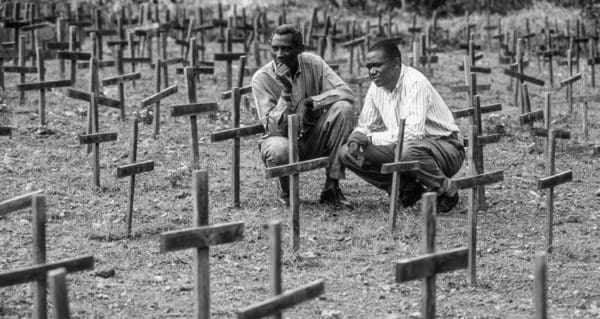 April marks the 24th anniversary of the beginning of the genocide in Rwanda.
April marks the 24th anniversary of the beginning of the genocide in Rwanda.
On April 6, 1994, the aircraft carrying Rwandan President Juvenal Habyarimana was shot down above Kigali. The worst genocide since the Holocaust began immediately thereafter.
A party of extremists within the majority Hutu population aimed to murder the entire Tutsi minority. Over the course of only three months, at least one million people were killed. Neighbour killed neighbour, husbands killed wives and children, and the weapons were household tools, farm implements and rough-hewn clubs.
The genocide had its roots in the formation of the Parmehutu Party founded in the 1960s. That party expounded an ideology of Hutu racial supremacy and agrarian socialism. The Parmehutu were determined to overthrow the Tutsi minority from whom the old Rwandan monarchy had been derived. The result was vilification of the Tutsis as oppressive feudal overlords and collaborators with Rwanda’s old colonial powers, Germany and Belgium. Violent pogroms were organized against the Tutsi minority, and hundreds of thousands of Tutsis left Rwanda in the 1960s and ’70s.
Despite this, the Parmehutu movement and its successor party, the National Republican Movement for Democracy and Development (NRMD), found nothing but support from the United Nations and most European powers.
But no foreign power was more involved and more destructive than Canada.
George Henri Lévesque, dean of social sciences at Université Laval, founded the National University of Rwanda in Butare. That university became a hotbed of Hutu extremism and the intellectual centre of the genocidal movement.
Rwanda was the jewel in the crown of Canada’s foreign aid program. The Canadian International Development Agency (CIDA) poured tens of millions of dollars into Rwanda between 1970 and 1994, and much of the Hutu elite was educated in Canada.
Leon Mugesera, an intellectual within the Hutu supremacist movement, received a grant from CIDA to complete his doctorate at Université Laval between 1982 and 1987. During that time, Mugesera co-founded a large network of Hutu extremists based in Canada called the Rwandan-Canadian Friends.
In 1992 on the eve of the genocide, Mugesera returned to Rwanda. At the NRMD annual party conference, Mugesera gave a revolting speech advocating the extermination of the Tutsi minority.
Mugesera stayed in Rwanda until the genocide began but swiftly returned to Canada, posing as a refugee. He and his family were given permanent residency almost immediately, and he obtained a teaching position at Université Laval.
In 2001, a CBC documentary entitled Leon Mugesera: The Spokesman of Hatred revealed the alarming fact that officials at our Foreign Ministry expedited Mugesera’s permanent residency and that one of the deputy ministers was Mugesera’s guarantor.
Mugesera was successfully deported from Canada only in 2012, and he was sentenced to life imprisonment in Rwanda alarmingly recently, on April 15, 2016.
So much for the fashionable misconception that Canada did nothing about the genocide in Rwanda. Far from it.
We funded, educated and then sheltered the man who gave the Rwandan genocide its intellectual impetus. We propped up the very government that instigated the genocide. We stood by and watched while it happened.
Now the federal government has announced a small peacekeeping mission to wartorn Mali in West Africa.
The last time Canadians took part in peacekeeping and development in Africa, it was a total disaster.
Why are we doing it again?
Dr. Michael Bonner is a political adviser based in Toronto. He has advised legislators at both the federal and provincial levels of Canadian politics. He holds a master’s and doctorate in Iranian history from the University of Oxford, and is the author of two books on pre-Islamic Iran.
The views, opinions and positions expressed by columnists and contributors are the author’s alone. They do not inherently or expressly reflect the views, opinions and/or positions of our publication.


